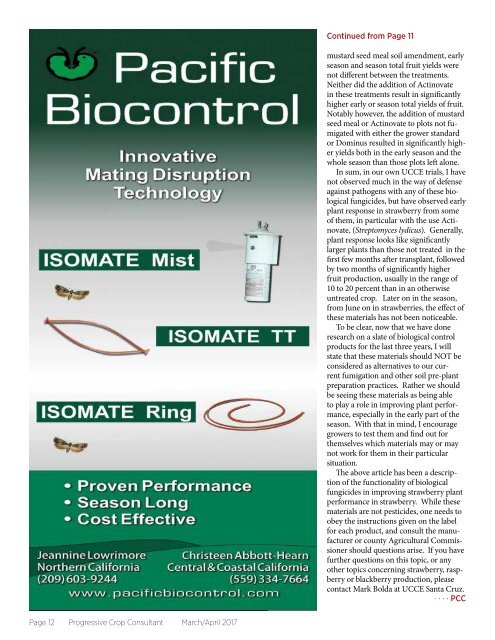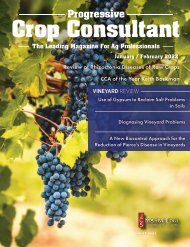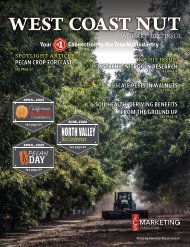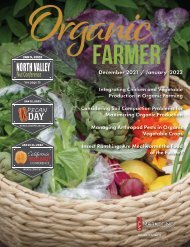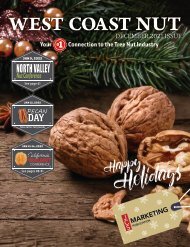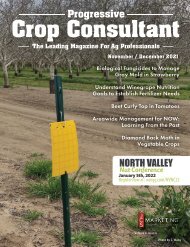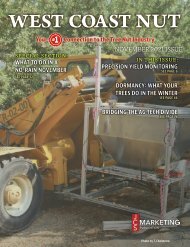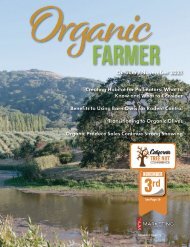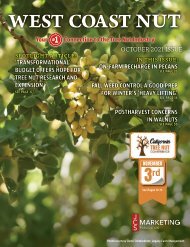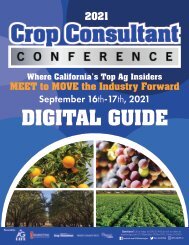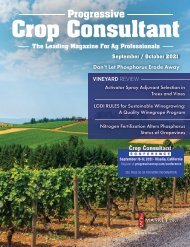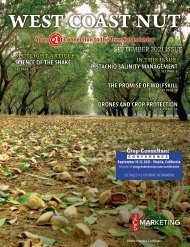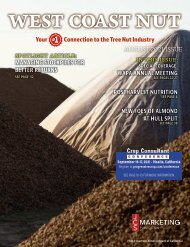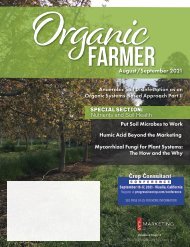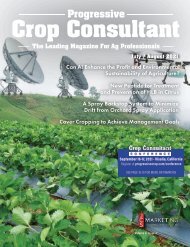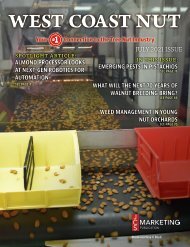Mar_Apr_PCC_2017_Web
Create successful ePaper yourself
Turn your PDF publications into a flip-book with our unique Google optimized e-Paper software.
Continued from Page 11<br />
mustard seed meal soil amendment, early<br />
season and season total fruit yields were<br />
not different between the treatments.<br />
Neither did the addition of Actinovate<br />
in these treatments result in significantly<br />
higher early or season total yields of fruit.<br />
Notably however, the addition of mustard<br />
seed meal or Actinovate to plots not fumigated<br />
with either the grower standard<br />
or Dominus resulted in significantly higher<br />
yields both in the early season and the<br />
whole season than those plots left alone.<br />
In sum, in our own UCCE trials, I have<br />
not observed much in the way of defense<br />
against pathogens with any of these biological<br />
fungicides, but have observed early<br />
plant response in strawberry from some<br />
of them, in particular with the use Actinovate,<br />
(Streptomyces lydicus). Generally,<br />
plant response looks like significantly<br />
larger plants than those not treated in the<br />
first few months after transplant, followed<br />
by two months of significantly higher<br />
fruit production, usually in the range of<br />
10 to 20 percent than in an otherwise<br />
untreated crop. Later on in the season,<br />
from June on in strawberries, the effect of<br />
these materials has not been noticeable.<br />
To be clear, now that we have done<br />
research on a slate of biological control<br />
products for the last three years, I will<br />
state that these materials should NOT be<br />
considered as alternatives to our current<br />
fumigation and other soil pre-plant<br />
preparation practices. Rather we should<br />
be seeing these materials as being able<br />
to play a role in improving plant performance,<br />
especially in the early part of the<br />
season. With that in mind, I encourage<br />
growers to test them and find out for<br />
themselves which materials may or may<br />
not work for them in their particular<br />
situation.<br />
The above article has been a description<br />
of the functionality of biological<br />
fungicides in improving strawberry plant<br />
performance in strawberry. While these<br />
materials are not pesticides, one needs to<br />
obey the instructions given on the label<br />
for each product, and consult the manufacturer<br />
or county Agricultural Commissioner<br />
should questions arise. If you have<br />
further questions on this topic, or any<br />
other topics concerning strawberry, raspberry<br />
or blackberry production, please<br />
contact <strong>Mar</strong>k Bolda at UCCE Santa Cruz.<br />
· · · · <strong>PCC</strong><br />
Page 12 Progressive Crop Consultant <strong>Mar</strong>ch/<strong>Apr</strong>il <strong>2017</strong>


